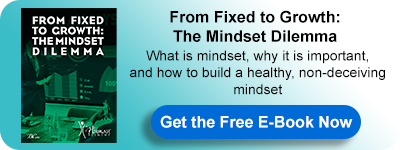From Fixed to Growth
Let’s start delving into the big question: Is it possible to change our mindset?
If a growth mindset sparks success, why then isn’t it adopted by most people? Why don’t we change the way we think?
Well, that’s a simple question that does not have a simple answer. The answer is rather complex.
Imagine Andy, an employee, going into a meeting room with an executive team. Armed with a growth mindset, he pulls out his laptop, strikes the pause, and goes on with his presentation. Then, boom, he forgets some of his lines and goes into a halt! His fears of humiliation, losing his career, and reputation are all materializing. Would he decide to go through this again and take on another presentation in front of the executive team? The answer is Yes, and No. It’s a No, provided his mindset is a Fixed one.
He will then view this as a failure that’s beyond him. He will label himself as a lousy speaker and will thus refuse any similar opportunities, preferring his low-profile comfort zone. Yet, if his mindset is a Growth one, he might feel the fear, yet his initial failure was not considered a one-timer. It was instead a challenge from which he learned a lesson. He will go on to the next opportunity, knowing more, and thus will not make the same mistakes. A growth mindset is mainly concerned with learning and progress. The difference between both mindsets lies in a four-letter word: FEAR. It’s mostly fear that stops people from changing their perspectives and mindsets.
“The key to change... is to let go of fear.”
- Roseanne Cash
What is Fear?
Fear is a primal, natural, and powerful human emotion. It involves both a universal physiological reaction and a solid individual emotional reaction. Fear warns us that there is a danger or a threat of harm, whether physical or psychological. 1
We resort to fear for protection from danger. However, sometimes the danger or threat is accurate, and sometimes it is an imagined one. We resort to fear to protect ourselves from the unknown. But how does this happen?
Explaining FEAR
The Human Element methodology, which provides a systematic approach for improving the way people work together, provides us with some insights regarding FEAR.
Sometimes we fear feeling insignificant, that we are not of value to others. While at other times, the fear stems from feeling incompetent. We fear that we do not have the skills to get the job done. Hence, we fear that our incompetence will be exposed to others. While sometimes, we fear rejection. We shield ourselves because we are worried that they might reject us if we come close to others. Those are all fears that we defend and protect ourselves from. Therefore, we need to seek change to have an inner peace that will reflect on our world outside and our relationships, whether at work or home.
Where does FEAR of change come from?2
Childhood experiences, familial attitudes, personal outlooks, current conditions, and even how people are programmed can all contribute to a fear of change.
For example, if a child grows up in a pessimistic home and is full of cynicism, they may be afraid of establishing a new relationship or just trying something new. If your parents have experienced trauma, abuse, or severe poverty, this is very frequent. Their experiences may have shaped a worldview that encourages them to believe that all roads lead to disaster. As a result, you’ve been socialized to be jaded and cynical as well. Instead, sticking to what is familiar becomes simpler.
Humans are conditioned and inherently designed to want to be in charge. It’s a natural process. As a result, both nature and nurture play a role in the dread of change.
Now that we’ve come that far, you must ask how it is possible to make a Mindset change? If it’s ingrained in our minds since our ancestors, how is it possible to change?
There is some good news and some bad news. The good news is that it is possible to change, while the bad news is that it needs hard work and effort.
1Very Well Mind, 19 June 2020, Lisa Fritscher, What is Fear, Accessed 14 Oct 2021, https://www.verywellmind.com/the-psychology-of-fear-2671696
2University of People, Accessed 14 Oct 2021, https://www.uopeople.edu/blog/why-you-have-fear-of-change-all-the-ways-to-overcome-it/
For more about this topic, download our latest book " From Fixed To Growth: The Mindset Dilemma " for FREE:
